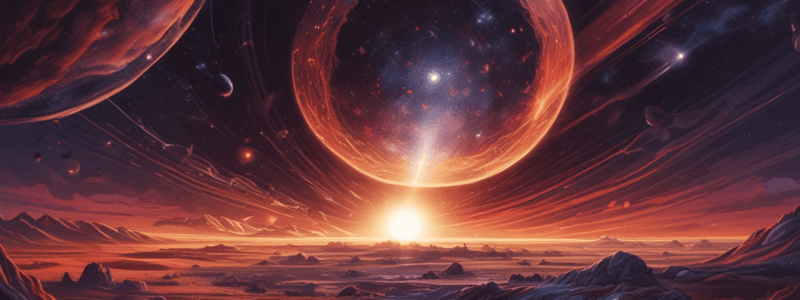Podcast
Questions and Answers
What must a star do before it can become a black hole?
What must a star do before it can become a black hole?
- Run out of fuel and collapse (correct)
- Become a neutron star
- Cool down to a low temperature
- Increase in size significantly
Which type of star ends its life as a black hole?
Which type of star ends its life as a black hole?
- A huge star, many times bigger than our sun (correct)
- A medium-sized star
- A small star like our sun
- A white dwarf star
What is the definition of density in relation to black holes?
What is the definition of density in relation to black holes?
- Volume divided by pressure
- Mass divided by volume (correct)
- Mass multiplied by volume
- Pressure divided by mass
Which scientist was the first to publicly use the term 'black hole'?
Which scientist was the first to publicly use the term 'black hole'?
What happens to the core of a star when it runs out of fuel?
What happens to the core of a star when it runs out of fuel?
Why can black holes not be detected visually?
Why can black holes not be detected visually?
What is a singularity in the context of black holes?
What is a singularity in the context of black holes?
Which of these statements about black holes is true?
Which of these statements about black holes is true?
When did scientists begin to theorize about black holes?
When did scientists begin to theorize about black holes?
How does a black hole form from a star?
How does a black hole form from a star?
What is the definition of a singularity in the context of a black hole?
What is the definition of a singularity in the context of a black hole?
What is the role of the event horizon in a black hole?
What is the role of the event horizon in a black hole?
How do supermassive black holes typically form?
How do supermassive black holes typically form?
What characteristic defines micro black holes?
What characteristic defines micro black holes?
What happens to matter that crosses the event horizon of a black hole?
What happens to matter that crosses the event horizon of a black hole?
What is a key feature of black holes in relation to galaxies?
What is a key feature of black holes in relation to galaxies?
What occurs when a neutron star collides with an existing black hole?
What occurs when a neutron star collides with an existing black hole?
What is one method by which black holes can grow larger over time?
What is one method by which black holes can grow larger over time?
Which option best describes the general existence of micro black holes?
Which option best describes the general existence of micro black holes?
What analogy is used to describe the event horizon of a black hole?
What analogy is used to describe the event horizon of a black hole?
Flashcards are hidden until you start studying
Study Notes
Misconceptions About Black Holes
- The sun will not become a black hole due to its insufficient mass.
- Black holes aren't vacuum cleaners; they do not actively suck in matter.
- Visual detection of black holes is impossible; their existence is inferred through gravitational effects.
- Time travel via black holes is a theoretical concept, not a proven reality.
- The term "black hole" was popularized in 1967 by physicist John Wheeler.
Formation of Black Holes
- A star collapses upon exhausting its nuclear fuel, leading to increased density.
- Small stars become white dwarfs, medium stars turn into neutron stars, while massive stars transform into black holes.
- The density during a star's collapse can approach infinity, as exemplified by envisioning the sun's mass concentrated within a city-sized volume.
- A singularity is formed in black holes, defined as an infinitely dense point with zero volume.
Key Characteristics of Black Holes
- The event horizon marks the boundary beyond which nothing can escape the black hole's gravity, akin to an airport security checkpoint.
- Matter crossing the event horizon is irrevocably drawn into the black hole.
Types of Black Holes
- Black holes vary in size, ranging from micro black holes to supermassive ones.
- Micro black holes, theorized to exist from the universe's infancy, are roughly the mass of a pound or two.
- The largest black holes arise when a neutron star collides with an existing black hole, creating an even larger entity.
- Accretion of surrounding matter contributes to the growth of black holes.
- Supermassive black holes are believed to reside at the centers of most large galaxies, including the Milky Way.
Studying That Suits You
Use AI to generate personalized quizzes and flashcards to suit your learning preferences.




